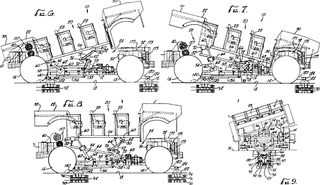
EMV is a payment method based on a technical standard for smart payment cards and for payment terminals and automated teller machines which can accept them. EMV stands for "Europay, Mastercard, and Visa", the three companies that created the standard.

The Toyota Soarer is a personal luxury GT coupé produced from 1981 to 2005 by Toyota and sold in Japan. It was available at both Japanese Toyota dealerships called Toyota Store and Toyopet Store, and it debuted with the Z10 series, replacing the Toyopet Store exclusive Mark II coupé, and the Toyota Store exclusive Crown coupé.
ASD most often refers to:
Contactless may refer to:
In decision theory, the expected value of perfect information (EVPI) is the price that one would be willing to pay in order to gain access to perfect information. A common discipline that uses the EVPI concept is health economics. In that context and when looking at a decision of whether to adopt a new treatment technology, there is always some degree of uncertainty surrounding the decision, because there is always a chance that the decision turns out to be wrong. The expected value of perfect information analysis tries to measure the expected cost of that uncertainty, which “can be interpreted as the expected value of perfect information (EVPI), since perfect information can eliminate the possibility of making the wrong decision” at least from a theoretical perspective.
Ease of movement (EMV) is an indicator used in technical analysis to relate an asset's price change to its volume. Ease of Movement was developed by Richard W. Arms, Jr. and highlights the relationship between volume and price changes and is particularly useful for assessing the strength of a trend. High positive values indicate the price is increasing on low volume: strong negative values indicate the price is dropping on low volume. The moving average of the indicator can be added to act as a trigger line, which is similar to other indicators like the MACD.

The Mountain Warfare Training Center (MWTC) is a United States Marine Corps installation located in Pickel Meadows on California State Route 108 at 6,800 feet (2,100 m) above sea level in the Toiyabe National Forest, 21 miles (34 km) northwest of Bridgeport, California. The training center exists to train units in complex compartmented terrain.

TV3 is a Czech free-to-air television channel. The network closed down in December 2001 after its broadcast license was revoked.
Galápagos syndrome is a term of Japanese origin used in business studies to refer to an isolated development branch of a globally available product. The term is used as an analogy to a part of Charles Darwin's On the Origin of Species. Darwin encountered in the Galápagos Islands isolated flora and fauna, which had undergone evolutionary changes independently from the mainland. This phenomenon was a key to the development of evolutionary theory. Darwin stated that due to the differences in environment from one island to another, species adapted to make survival more viable in the local environment of each island. Similarly, a development of goods "in relative isolation from the rest of the world because of a focus on the local market" can lead to similarly differing products.

An enhanced motion vehicle, or EMV, is a ride vehicle developed by Walt Disney Imagineering, a component of The Walt Disney Company, for use in amusement park rides located at Disney's theme parks. Riders are seated on a modified motion simulator base that is mounted on a wheeled chassis. As the vehicle travels through the attraction, the motion base simulates movement, such as driving over rough terrain or leaning through a turn, that makes the ride experience appear more realistic.
Escuela Mexicana del Valle (EMV)/Escuela Mexicana Americana (EMA) is a private school system in Colonia del Valle, Benito Juárez, Mexico City. It consists of seven campuses, and serves levels preschool until senior high school (preparatoria).

PIN was a debit card brand in the Netherlands from 1990 until 2012, owned by Currence. PIN was a magnetic stripe card, which never migrated to the EMV chip. It was therefore discontinued in 2012, after the switch-over from magnetic stripe authentication to EMV chip authentication in the Netherlands was completed. PIN was replaced by Maestro and V Pay debit cards, but as most PIN cards were already co-branded with Maestro long before 2012, consumers noticed little of the change.
This page is based on this
Wikipedia article Text is available under the
CC BY-SA 4.0 license; additional terms may apply.
Images, videos and audio are available under their respective licenses.





